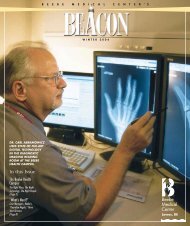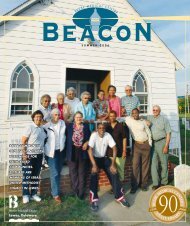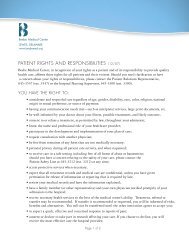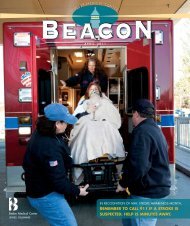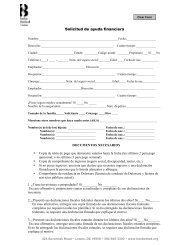Beacon-Summer 2005 - Beebe Medical Center
Beacon-Summer 2005 - Beebe Medical Center
Beacon-Summer 2005 - Beebe Medical Center
You also want an ePaper? Increase the reach of your titles
YUMPU automatically turns print PDFs into web optimized ePapers that Google loves.
Diaz Bonville, Sussex County community activist, educates African-American men about the<br />
importance of regular screenings for prostate cancer.<br />
Q<br />
A<br />
Q<br />
A<br />
Some sources in the national arena say that the<br />
lack of available healthcare, or health insurance,<br />
is one reason that these statistics are so staggering.<br />
Do you agree<br />
I think this also is true. I know that many don’t<br />
have health insurance. Many work in jobs that<br />
don’t have health plans, and they can’t afford to<br />
buy their own insurance. Often times, even if they<br />
have health insurance, or qualify for Medicaid, they<br />
can’t take the time off from work to get a screening<br />
because they work hourly and can’t afford to lose<br />
the income. Even if they have insurance, they can’t<br />
afford the co-pay, and don’t want to spend money<br />
on themselves for something that they don’t consider<br />
important.<br />
Discrimination also has been cited in medical<br />
publications as a reason for lack of screenings<br />
and treatment. Do you think that discrimination<br />
and/or mistrust on the part of African-American<br />
men for the establishment also plays a part in<br />
this situation<br />
There’s definitely a mistrust of the establishment,<br />
and what the healthcare establishment says and<br />
does. The African-American has suffered discrimination.<br />
Many people are still alive who can tell you<br />
some very sad and painful stories. It isn’t as bad<br />
today as it was in the past. There has been a lot of<br />
progress, but there is room to improve. Some African-<br />
Americans still feel as if they are not treated the<br />
same as other people are treated, whether in the<br />
Q<br />
A<br />
healthcare environment or in any other. I believe<br />
that the bottom line, though, when it comes to<br />
cancer, is that we are talking about the difference<br />
between living and dying.We have to move forward.<br />
Men have to realize that they have to attend to their<br />
health—that if they don’t, they will die.<br />
What can we do to increase the awareness of<br />
African-American men in order to cut these high<br />
prostate cancer mortality rates<br />
We need leaders in the African-American community<br />
to take this on and to focus on raising awareness.<br />
People just don’t think about it. More of the church<br />
leaders should talk about it. People who go to church<br />
will listen to them. But we also need other community<br />
leaders, too.We need African-American leaders<br />
who are well known to raise the awareness.We need<br />
local doctors and healthcare officials to come to<br />
activities and gatherings in the African-American<br />
community to show their support for the community.<br />
This is something that is going to take a lot of time<br />
and effort and repetition to make a difference. ■<br />
<strong>Beebe</strong> <strong>Medical</strong> <strong>Center</strong> is calling on black<br />
male leaders, like Diaz Bonville, to help<br />
us reach black men age 40 and older<br />
who have not been screened for prostate<br />
cancer in the past year. Call 645-3100,<br />
ext. 5139, for more information.<br />
11


